Eurovision: The (fun) Saga of the Bizarre and Strange
I first discovered Eurovision in 2018. Israel has just won with the song Toy. I don’t recall how I heard about it, but it was probably Facebook (the algorithm knows I like non-traditional music.)
I started listening. I was intrigued. It alternates between EDM, brass, and an electric drum beat. It is only 3 minutes long. It gets in, makes its point, and then gets out—nothing extraneous, which I appreciate. In the vernacular of the day, it is a bop. And it is a pro-feminism song–a woman telling a boy that she will not be his toy.
Then I heard it.
The singer in the song begins to cluck and bawk like a chicken.1 I was very confused.
I had to listen to the song again. These were my thoughts (in order):
What the hell did I just listen to?
Do I like it or hate it?
I need to listen to this again.
If this song won, what did the other songs sound like?!
Wait, what is Eurovision?
I think somewhere in the recesses of my mind, I had heard of Eurovision before, but I knew nothing about it–especially the songs that came out of the competition. As I started doing some research, I discovered this was where superstars ABBA, Olivia Newton-John, and Celine Dion got their start. I instantly found myself drawn into the bizarre, weird, over-the-top, theatric, yet utterly fantastic world that is Eurovision. It is a spectacle like no other (and I just finished watching Carnival). 2
Every year, each country holds a national competition to select the artist representing that country. There is nothing in the rules about the language of the song. The songs can be sung in English or the country’s native language. While many countries choose to sing in English, plenty of winners have sung in their native tongue. Songs can’t be more than three minutes in length, and the songs must be original—no covers. There is much more to making a successful song for Eurovision, though. Former Eurovision winner Måns Zelmerlöw and Swedish comedian Petra Mede hosted the award show a few years ago. They performed a comedic skit/song that exemplifies the absurdity and insanity that go into creating a Eurovision-winning song.
They jokingly suggest starting your song with battle horns or beating drums. They talk about how the country's performer should be an old man or woman playing an ethnic instrument that no one has ever heard of–or just to make up something that no one would ever know. Adding a DJ or a flaming piano, along with outlandish costumes, is also a must. They talk about how the best songs are the ones that are overly sentimental about peace, love, or war. The chorus pokes fun at the entire process with:
Love peace peace love
Make it unforgettable
And you will be the best
And win the Eurovision Song Contest!
Camp is part of what defines Eurovision. Even with the campiness, though, there have been some stranger entries to the contest over the years. These extend far beyond camp. They range from dancing penguins to rapping astronauts to a group of grannies playing weird pan flutes to singing pirates. One year, there was even an entry where the song affirmed that vampires are alive. One of the more memorable (!) lines from that song is:
Vampires are alive
The legends have to survive
We'll never come undone
And we will be forever young
Weird—I mean, some bizarre shit. The kind of shit that if I were watching on drugs, I don’t know whether it would be terrifying or amazing.
Since that fateful moment in 2018, I look forward to listening to all the music going to the competition. I have created a playlist on Spotify of my favorites that I will listen to year-round. As a celebration of Eurovision, I decided to include some of the more different songs and attempt to explain why I like them.
El Diablo by Elena Tsagrinou, for Cyprus, placing 16th in 2021
This is your typical fast-paced pop song with a catchy tune. The reason I like this song, though, is because I picture the singer falling in love with Gus Griswald’s dodgeball-playing alter-ego from the cartoon Recess nicknamed “El Diablo.”3
I recognize that I may be the only person in the world who thinks this is a funny connection. But every time I hear this song, I think about that episode of Recess.
Heroes by Måns Zelmerlöw, for Sweden, winning song of 2015
Once I heard Toy, I listened to the winning songs from previous years. This one stuck out due to its odd lyrics and mix between twangy country and fast-paced rock song.
Zelmerlow sings the first verse in a country-tinged accent and makes what I assume is a mythological/western reference:
Don't tell the gods I left a mess
I can't undo what has been done
Let's run for cover
What if I'm the only hero left?
You better fire off your gun
Once and forever
He is then told to seize the day and
To go sing it like a hummingbird
The greatest anthem ever heard
The music then shifts from a country ballad to a driving rock song and declares:
We are the heroes of our time
But we're dancing with the demons in our minds
This is the chorus and repeats many times throughout the song. It is a call to action–a time to stand and loudly proclaim… whatever. But the song turns dark, indicating that while we are heroes, we are still haunted by the “demons in our minds.”
Ok…
The song tells the audience, "The crickets sing a song for you…it’s life’s creation.” It also says, “I make worms turn into butterflies…turn this world around in appreciation.”
I’m unsure if there is anything special about the multiple animal references, but in my quick Google search, I discovered that hummingbirds don’t sing in the traditional bird way. So, I’m not really sure why he is telling the world to sing like a hummingbird.
I don’t know; the song is weird, but it is catchy, and the driving beats and the powerful vocals make it a fun song to listen to. Like many Eurovision songs, it is anthemic and stirring.
Rise Like Pheonix by Conchita Wurst, for Austria, winning song of 2014
This song has everything that a solid James Bond theme song contains. It rivals the likes of Skyfall or Diamonds Are Forever in its musical style. The opening sting just reeks of James Bond. It also has lush orchestrations, soulful, soaring, powerful vocals, and a message of resilience. The lyrics are pretty straightforward—they speak of overcoming opposition and seeking to correct injustices. It really is an anthem that goes beyond Eurovision.
The thing that makes this song even more impactful is that Conchita Wurst is the drag name and persona of Thomas Neuwirth. Drag is often associated with an over-the-top personality–a campiness that is visible in the makeup and fashion choices. Conchita Wurst's drag style is distinctive for incorporating her beard, while her makeup and fashion lean towards conservatism in contrast. Instead of theatricality, in her Eurovision performance, Wurst was more understated to add a sense of gravitas to her performance. That, paired with the giant LED wall that makes it look like she has wings of fire and the shooting pyrotechnics at the end (I mean, they had to have something over the top), made for a winning performance. She easily won the competition by placing first in the semi-finals and the finals.
Cha, Cha, Cha by Käärijä, for Finland, placed second in 2023
Let’s take a moment and pause before we get to this song because it is a lot to take in.
(deep breath)
OK, here we go.
Let’s discuss the actual song before I go through the performance. This song is probably one of my favorite Eurovision songs of all time. It is NOT in English, but in Finnish–so I have no idea what the words mean; I have sort of learned the lyrics phonetically. I have read translations of the lyrics, so I have a basic understanding of what is happening. But we will get to that in a second.
Finland is known for its many metal bands, and this song takes inspiration from them. The song starts like something you would hear at an EDM rave–a single driving bass note–then Käärijä starts rapping in a monotone, low, gravelly tone. There is a mini pre-drop (is that even a thing?), and the song shifts tones. Now, the performer is rapping at a higher intensity than before. And every other line he, along with others, chants “cha, cha, cha, cha, cha, cha, cha.” The song reverts to the single bass note driving rhythm and another build-up re-starts. Käärijä repeats the low monotone rap, and then moves back into the higher intensity cha, cha, cha, cha, cha, cha, cha.
Suddenly, the main drop of the song hits, and everything changes. Most EDM drops go from a build-up to an explosion of beats, bass, and melodies. This song, however, goes from EDM to the exact opposite of that. It goes to an autotuned boy band bubble gum pop song.4 The entire mood of the song changes. It goes from aggressive, metal-inspired to Käärijä singing a fun and bouncy tune, still interspersed with a happier “cha, cha, cha” throughout. Stylistically, the song is weird. But, to its credit, it is nothing I have ever heard before, which I immediately liked.
Käärijä’s performance at Eurovision was equally inspiring as it was odd. It is a perfect example of “What the hell did I just watch?” and “That went in a completely different way than expected.” His costume was equally bizarre. Käärijä wore a fluorescent green bolero jacket with no shirt underneath, leather pants with spikes on the sides, and chunky combat boots.
Where Conchita Wurst was dignified and empowering in her song, Käärijä is quite literally the opposite.
His set begins on a stage that looks as if it is made from palettes. He kicks one of the boards out, puts his face through, and starts the song. He gestures with his tongue when not singing, something you might see at a Kiss or Megadeath concert–not typically at Eurovision.
When he gets to the 2nd verse (the first pre-drop), four dancers come out, dressed in bright pink flamenco outfits. They are each attached to a pink ribbon that Käärijä seems to hold and control. They are striking poses and dancing to the music with huge Colgate smiles. As Käärijä goes into the second build-up, the dancers join him on the palette stage and start dancing as if they're at a rock concert–gyrating all over the stage and each other—in their Flamenco outfits.
At the main drop/transition, the palettes swing out, and Käärijä’s demeanor changes with the music. He is now smiling and dancing more choreographed moves than the previous chaos. He goes from making a modified jazz finger move to a (for lack of a better way of describing it) “heigh-ho, it’s off to work I go” move.
From this point, the entire song is a party. He rides the dancers across the stage as they throw confetti, and the whole thing ends in one last "cha, cha, cha,” head-banging the entire way home.
The performers seem to enjoy themselves immensely as they sing and dance to this song. It is just a fun, feel-good song. Dancing along, whether in your car or house, is mandatory when this song comes on. The lyrics are about having a night out, drinking, and just being able to cut loose and enjoy yourself—pretty shallow when compared to Conchita Wurst, but he is able to hold his own.
This song caused quite a stir at last year’s competition because it was the worldwide audience favorite but came in second overall. Many felt it should have won; there was even a conspiracy theory about why it did not win.
I told you it was a lot.5
As you can see, Eurovision is quite a sight to behold. I didn’t even get into the judging because I have tried to understand the points system, but it continues to elude me. All I know is that there is a panel of judges from all the represented countries, and people all over Europe can also submit their votes.
From Wikipedia: “All participating countries compete in one of the two semi-finals, except for the host country of that year's contest and the contest's biggest financial contributors known as the "Big Five"—France, Germany, Italy, Spain, and the United Kingdom. The remaining countries are split between the two semi-finals, and the ten highest-scoring entries in each qualify to produce 26 countries competing in the final.”
Interestingly, the USA has never been invited to participate. This is for the best. Americans tend to take things too seriously and have different musical values than other countries. The USA tried to do an American version with competition among the states, but the interest wasn’t there, and it didn’t get Eurovision's notoriety. While the participating European countries take the competition seriously, they don’t take themselves seriously; they enjoy and embrace the absurdity and campiness of it. The USA would struggle with this.
These songs are just the tiniest, tippiest tips of the proverbial iceberg. Hundreds of songs have gone through Eurovision; many songs are not worth a second listen, but many are just great pop songs. I have a friend who described Eurovision as the “musical Olympics”--countries coming together to compete but with music instead of sports. I think that is an excellent way of looking at the competition. Unlike the Olympics, Eurovision gives you many 3-minute nuggets of joy, insanity, and fun every year.
Here is to many more years of strange, crazy, bizarre, and fun music!
Cha, cha, cha, cha, cha, cha!
(Eurovision 2024 is streaming on Peacock in the USA on May 7, 9, 11).
She is using the word baka, which means stupid in Japanese. But the way she sings, it sounds like she is imitating a chicken).
In 2020, Netflix released a comedy spoofing the competition entitled Eurovision Song Contest: The Story of Fire Saga. While an exaggerated comedy, it does an excellent job of highlighting some of the more absurd aspects of the event.
In this episode, the usually timid Gus has to bring back his fearless dodgeball persona known as El Diablo. One that he has tried to hide and forget about because it led to a younger child getting hurt.
In writing this, I read this style of music is called schlager and is defined as “catchy instrumental accompaniments to vocal pieces of pop music with simple, easygoing, and often sentimental lyrics.”


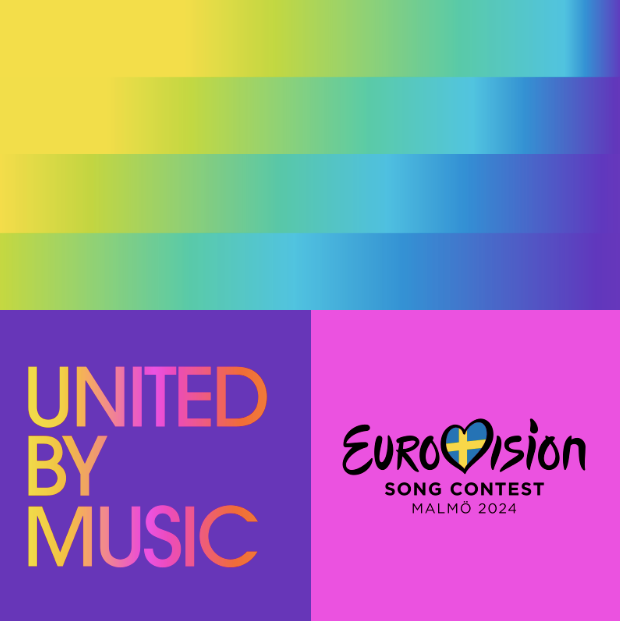
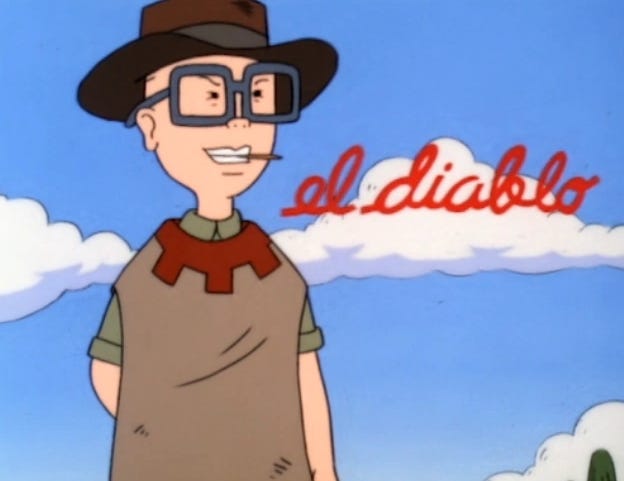
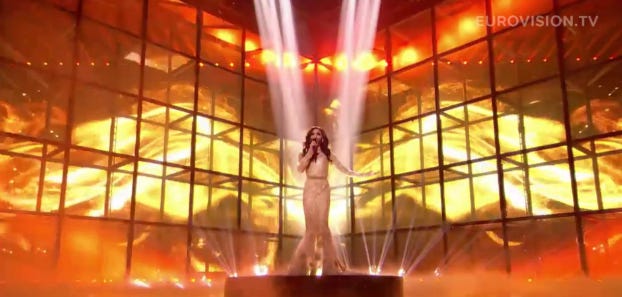
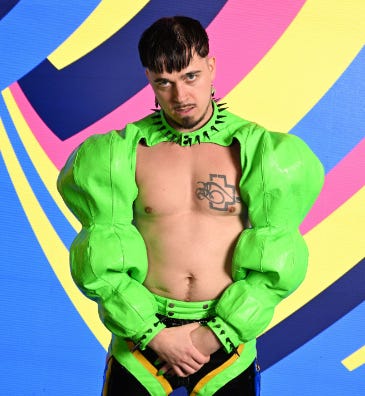
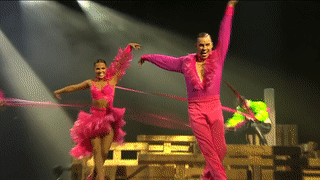
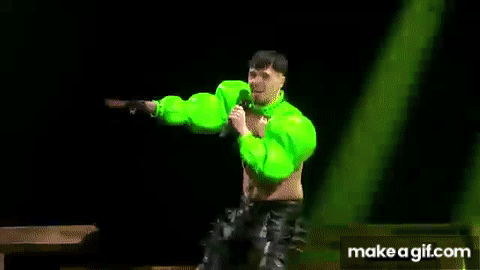

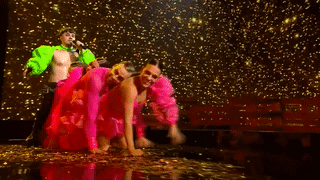
I think you got me started with Eurovision from a Facebook voting bracket? Either way, I second Rise Like A Phoenix and ask humbly that you listen to Valentine Lost from Iceland, 2007. One of my favorites!